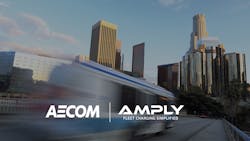AMPLY Power, AECOM partner to bolster bus electrification for transit agencies to meet zero-emission goals
AECOM and AMPLY Power (AMPLY) have partnered to help bus fleet owners address and accelerate their zero-emission initiatives.
By combining AMPLY’s operational expertise and unique Charging-as-a-Service technology with AECOM’s specialization in large-scale transportation and utility projects, the partnership provides transit agencies with a turnkey approach to optimize their infrastructure and operations for electrification.
“This partnership is an important step in the transition toward 100 percent electric mobility,” said Andrew Bui, AECOM vice president, national transportation innovation lead. “Although 100 percent zero-emission transit bus goals are still years away, it’s critical to address now so that infrastructure and facilities can scale to support efficient electric operations. To facilitate moving fleets from pilot stage to full adoption. We believe this partnership offers what a fleet operator requires, from design and financing to fleet charging infrastructure implementation and management.”
AECOM specializes in supporting electric fleet conversions by creating efficient staging, optimizing infrastructure requirements, integrating new infrastructures like solar canopies, designing and coordinating utility infrastructure and siting new facility locations. AMPLY brings their economical Charging-as-a-Service model to the table, which provides charging hardware deployment, management of depot upgrades and utility interconnections, real-time software-controlled charge optimization, debt financing of capital expenditures and resiliency planning.
“Fleet electrification provides a tremendous opportunity to not only reduce greenhouse gases but improve air quality and overall public health,” said Simon Lonsdale, AMPLY head of sales and strategy. “Partnering with AECOM, a globally respected infrastructure consulting firm and a Fortune 500 company, validates our fully managed, Charging-as-a-Service model and helps us expand public sector and commercial electric fleet adoption through guaranteed performance, fixed fuel pricing, and now, proven large-scale project design and engineering.
AMPLY recently broke ground on a project with the Anaheim Transportation Network (ATN), where they estimated a potential $4.8 million in fuel savings over the next 20 years for the 46 vehicles in the electric bus fleet. This builds on AMPLYs 2020 whitepaper, which found that in more than 84 percent of the top metropolitan areas in the United States, it is cheaper to re-fuel electric trucks, buses and passenger vehicles with electricity than fossil fuels. Through a service offering with a fixed price metered by utilization, fleet customers like ATN can draw a direct economic comparison to dispensing fossil fuel without upfront capital costs and operational uncertainty.
AECOM is currently working with Washington Metro Area Transit Authority (WMATA), initially on year-long planning efforts, and now leading facility design to accommodate WMATA’s 12 electric-bus pilot project, an important first step for WMATA as it aims to convert the entire fleet of more than 1,500 buses to zero-emission.
“AECOM is excited to work with WMATA on their journey to electrify their fleet, and to explore the turnkey solutions through this partnership with AMPLY to help scale their pilot and accelerate their fleet conversion,” said Bui. “There’s no longer doubt that fleets need, and want to electrify, as evidenced by the increasing legislative mandates across the country, adds Lonsdale. Considering these electric buses have a lifespan of 25 years or more, and in 20 short years, California’s zero-emission bus goals will be in full effect, forward-looking transit agencies know the time is now to get serious about electrification. This partnership provides them with the qualified support and expertise they need to get them out of the gate and on the road to significant fuel and emissions savings, ahead of the mad dash that is coming.”
